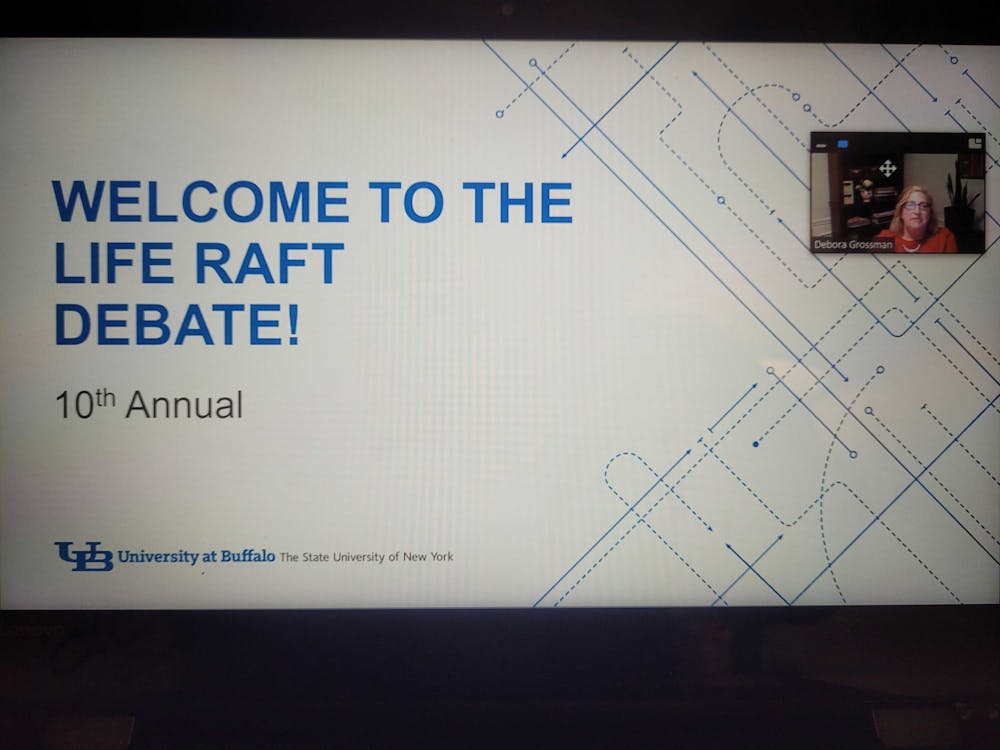Students placed their faith in environmental engineering professor John Atkinson to propel the future of humanity forward during UB’s 10th annual Life Raft Debate Wednesday.
Five professors — Atkinson, Kenneth Hoffmann, Craig Centrie, Elizabeth Mazzolini and Jacob Neiheisel — took to the virtual stage to argue why their academic disciplines would be the most useful in the wake of a hypothetical apocalypse. Roughly 90 students watched as contestants delivered eight-minute presentations and two-minute rebuttals on why they deserved the last seat on a life raft sailing away from the ruins of a post-apocalyptic world.
Atkinson won the contest with 38% of the audience’s vote.
Atkinson anchored his argument around the holistic approach taken by sustainability engineers and argued that engineers are “multifaceted and open minded.” He said sustainability hinges on three pillars: “ethics, energy and economy.” All the other contestants’ fields might engage with these ideas to some extent, but only sustainability engineers regularly grapple with all three, he argued.
“By considering these topics equally, sustainability engineers are multifaceted and open minded,” Atkinson said during opening arguments. “I think we greatly diverge from traditional engineers in this regard.”
Atkinson built upon his opening statement by challenging conventional stereotypes about engineers and misconceptions about what their work entails. He argued that, as a sustainability specialist, he does not just focus on “technology and mathematics,” but regularly considers humanity issues in his work as well.
“Problems on deserted islands come from inequality, arrogance, ego and imbalance,” Atkinson said, “not from innovation, technology and mathematics; the skills we typically attribute to engineers.”
The runner-up, professor of neurosurgery Kenneth Hoffmann, had a notably different argument from the other contestants. Hoffman’s presentation broke the mold by arguing that the life raft scenario itself was, in fact, irrelevant. Since the entire world had perished in the hypothetical apocalypse, Hoffmann argued, there was no inhabitable island to sail off to as the prompt suggests. Hoffmann explained that, if selected, he would encourage the group to remain where they were instead of charting a course to greener pastures.
Honors College Director Tim Tryjankowski, the event's coordinator, said that hosting the event during a pandemic made it even clearer that every discipline is essential to society.
“With COVID-19, I think it's more important than ever to see how every discipline plays a role in the greater good,” Tryjankowski wrote in an email. “We need historians to record events of the world today, to learn from [them]; we need biomedical researchers to understand then create a vaccine for COVID-19; we need politicians and social workers to distribute the vaccine in some order; we need engineering to manufacture and distribute a vaccine. We need social releases [and] we need the arts and books for diversion, company. We need physical and mental health, COVID-19 rules on distancing, masks and quarantine. In an instant, we needed every discipline’s best. The life raft debate used to be a fun exercise in ‘what ifs.’ Today, it is an example of why we need every discipline’s best to survive.”
Centrie, adjunct professor of Africana and American Studies, Mazzolini, associate professor of English and Neiheisel, associate professor of Political Science, all lost a seat on the life raft.
The final participant was last year’s winner, professor of psychology Shira Gabriel, who played devil’s advocate. It is customary for the previous year’s winner to play this role in the following debate. Gabriel tried to convince the audience it would be better to leave the seat empty than to bring any of the professors along. Gabriel argued that students were probably better off without the help of any of the older professors, noting how previous generations have continued to fail younger ones.
“What you need is to go one without us,” Gabriel said. “What you need is to get on that boat and use that extra space for, I don’t know, snacks? Something other than us.”
The news desk can be reached at news@ubspectrum.com





